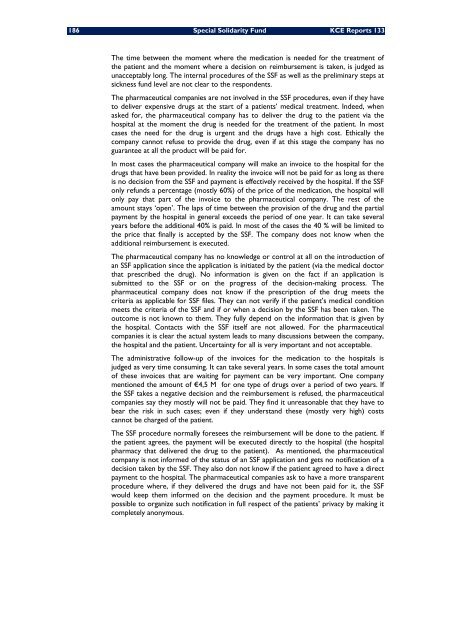Optimalisatie van de werkingsprocessen van het Bijzonder ... - KCE
Optimalisatie van de werkingsprocessen van het Bijzonder ... - KCE
Optimalisatie van de werkingsprocessen van het Bijzonder ... - KCE
You also want an ePaper? Increase the reach of your titles
YUMPU automatically turns print PDFs into web optimized ePapers that Google loves.
186 Special Solidarity Fund <strong>KCE</strong> Reports 133<br />
The time between the moment where the medication is nee<strong>de</strong>d for the treatment of<br />
the patient and the moment where a <strong>de</strong>cision on reimbursement is taken, is judged as<br />
unacceptably long. The internal procedures of the SSF as well as the preliminary steps at<br />
sickness fund level are not clear to the respon<strong>de</strong>nts.<br />
The pharmaceutical companies are not involved in the SSF procedures, even if they have<br />
to <strong>de</strong>liver expensive drugs at the start of a patients’ medical treatment. In<strong>de</strong>ed, when<br />
asked for, the pharmaceutical company has to <strong>de</strong>liver the drug to the patient via the<br />
hospital at the moment the drug is nee<strong>de</strong>d for the treatment of the patient. In most<br />
cases the need for the drug is urgent and the drugs have a high cost. Ethically the<br />
company cannot refuse to provi<strong>de</strong> the drug, even if at this stage the company has no<br />
guarantee at all the product will be paid for.<br />
In most cases the pharmaceutical company will make an invoice to the hospital for the<br />
drugs that have been provi<strong>de</strong>d. In reality the invoice will not be paid for as long as there<br />
is no <strong>de</strong>cision from the SSF and payment is effectively received by the hospital. If the SSF<br />
only refunds a percentage (mostly 60%) of the price of the medication, the hospital will<br />
only pay that part of the invoice to the pharmaceutical company. The rest of the<br />
amount stays ‘open’. The laps of time between the provision of the drug and the partial<br />
payment by the hospital in general exceeds the period of one year. It can take several<br />
years before the additional 40% is paid. In most of the cases the 40 % will be limited to<br />
the price that finally is accepted by the SSF. The company does not know when the<br />
additional reimbursement is executed.<br />
The pharmaceutical company has no knowledge or control at all on the introduction of<br />
an SSF application since the application is initiated by the patient (via the medical doctor<br />
that prescribed the drug). No information is given on the fact if an application is<br />
submitted to the SSF or on the progress of the <strong>de</strong>cision-making process. The<br />
pharmaceutical company does not know if the prescription of the drug meets the<br />
criteria as applicable for SSF files. They can not verify if the patient’s medical condition<br />
meets the criteria of the SSF and if or when a <strong>de</strong>cision by the SSF has been taken. The<br />
outcome is not known to them. They fully <strong>de</strong>pend on the information that is given by<br />
the hospital. Contacts with the SSF itself are not allowed. For the pharmaceutical<br />
companies it is clear the actual system leads to many discussions between the company,<br />
the hospital and the patient. Uncertainty for all is very important and not acceptable.<br />
The administrative follow-up of the invoices for the medication to the hospitals is<br />
judged as very time consuming. It can take several years. In some cases the total amount<br />
of these invoices that are waiting for payment can be very important. One company<br />
mentioned the amount of €4,5 M for one type of drugs over a period of two years. If<br />
the SSF takes a negative <strong>de</strong>cision and the reimbursement is refused, the pharmaceutical<br />
companies say they mostly will not be paid. They find it unreasonable that they have to<br />
bear the risk in such cases; even if they un<strong>de</strong>rstand these (mostly very high) costs<br />
cannot be charged of the patient.<br />
The SSF procedure normally foresees the reimbursement will be done to the patient. If<br />
the patient agrees, the payment will be executed directly to the hospital (the hospital<br />
pharmacy that <strong>de</strong>livered the drug to the patient). As mentioned, the pharmaceutical<br />
company is not informed of the status of an SSF application and gets no notification of a<br />
<strong>de</strong>cision taken by the SSF. They also don not know if the patient agreed to have a direct<br />
payment to the hospital. The pharmaceutical companies ask to have a more transparent<br />
procedure where, if they <strong>de</strong>livered the drugs and have not been paid for it, the SSF<br />
would keep them informed on the <strong>de</strong>cision and the payment procedure. It must be<br />
possible to organize such notification in full respect of the patients’ privacy by making it<br />
completely anonymous.

















